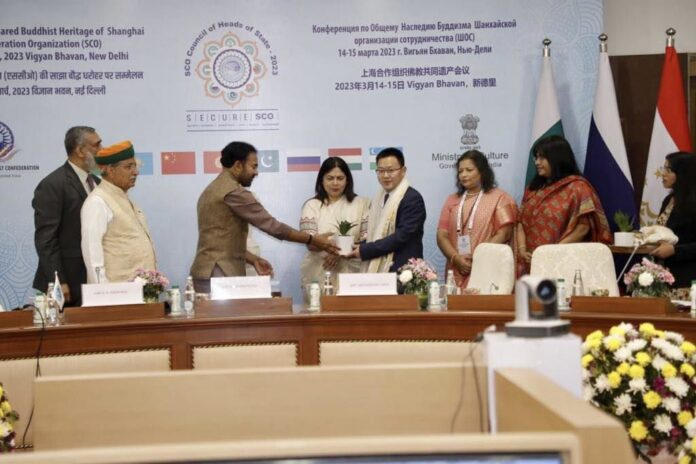The Shanghai Cooperation Organization (SCO) nations and India were the focus of a conference on “Shared Buddhist History” that has organised on March 14 and 15 at Vigyan Bhawan in New Delhi.
The historic gathering debated “Shared Buddhist History” and was the first of its type under India’s leadership of the Shanghai Cooperation Organization (SCO) (from September 17, 2022, to September 20, 23).
Members, Observer States, and Conversation Partners of the SCO include China, Russia, and Mongolia. More than 15 academics and delegates, including those from the International Theravada Buddhist Missionary University in Myanmar, the Dunhuang Research Academy in China, the Institute of History, Archaeology, and Ethnology in Kyrgyzstan, the National Museum of Antiquities of Tajikistan and the Belarusian State University and the State Museum of the History of Religion in Russia, presented research papers on the subject.
The World Buddhist Confederation, a grantee organisation of
the Ministry of Culture, the Foreign Affairs Ministry, and the Ministry of Culture are the major organisers of the two-day programme. Many Buddhist experts from India will also take part in the event. Also, participants can see some of Delhi’s historic locations.
The Conference aims to reestablish cross-cultural relations and look for similarities among Central Asian Buddhist art, art movements, archaeological locations, and antiquity in various SCO nation-state museum collections.
The evolution and dissemination of ideas since the dawn of time are among the natural wonders of this earth. Effortlessly navigating difficult mountains, large oceans, and international borders; finding inspiration in foreign cultures; and crossing national boundaries. The appeal of Buddha’s uniqueness is also distinctive.
Its universality transcended location and time. Its humanistic philosophy pervaded sculpture, architecture, and subtle facets of human personality, finding expression in compassion, peaceful coexistence, environmentally friendly living, and personal development.
The Conference is a singular gathering of minds where nations from various geographical areas but with a common bridge connecting them according to a shared civilisation legacy, bolstered by Buddhist missionaries who played an important role in integrating various cultures, traditions, communities, and regions in the entire Indian subcontinent and Asia, will discuss for two days’ worth of various themes, outlining ways to maintain the centuries-old ties into the future.


